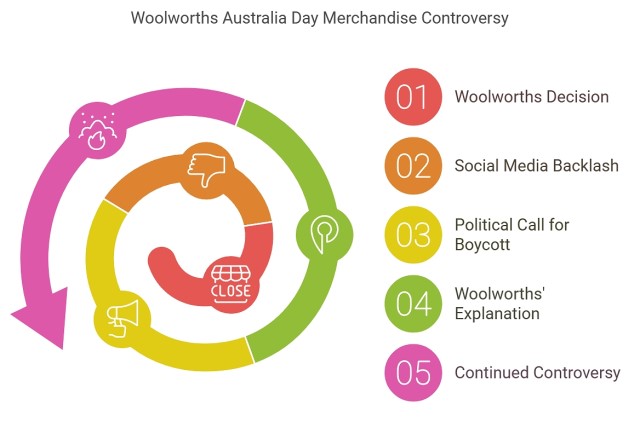
Woolworths' decision to reintroduce Australia Day merchandise in 2025 confirms the concerns many raised last year after it removed these products in 2024, citing declining demand and cultural sensitivities. I warned that it risked entangling business with politics. Now, with this reversal, it's clear those warnings were justified.
This situation highlights important lessons for businesses moving forward.
The Fallout from 2024
As soon as Woolworths announced it would not be selling Australia Day merchandise in 2024, the trouble started. People began voicing their dissatisfaction on social media. Then, Opposition Leader Peter Dutton called for a boycott. Woolworths' attempt to frame the decision as a response to "declining demand" and "broader discussions" about January 26 did not dampen the controversy.
Financial and Reputational Damage
Immediately, the financial impact was evident, reflected in customers voting with their wallets. The reputational damage was equally severe, with Woolworths labelled "unAustralian" by critics and its employees facing abuse from frustrated shoppers.
The CEO's Missteps
Then, the handling of the situation by CEO Brad Banducci's comments about the decision being "commercial" rather than political rang hollow. By stepping into the divisive debate of Australia Day, Woolworths blurred the line between commercial decisions and political statements.
2025: A Course Correction That Proves My Point
Fast-forward to now, and Woolworths has reversed its stance. The retailer said it will now sell Australia Day merchandise on a unique stand in its stores on Australia Day, again including Australian-made flags and themed products available in stores and online. A spokesperson admitted that last year's decision was a mistake, stating, "We listened and recognised that many customers and teams wanted us to do more to help them celebrate the day."
What Changed?
Customer Feedback
Woolworths acknowledged that many customers traditionally wanted to celebrate Australia Day, pushing the company to rethink its approach.
Focus on Local Products
By selling Australian-made flags instead of imported ones, Woolworths has aligned its offerings with patriotic sentiment while supporting local manufacturing.
Neutral Framing
This time, Woolworths avoided framing its decision within broader social or political discussions, focusing instead on meeting customer demand.
These changes reflect a strategic pivot back to customer-centric decision-making—a point I emphasised in my critique last year.
Why Businesses Should Avoid Political Stances
Woolworths' experience underscores why businesses should avoid politically charged issues unless they are central to their brand identity or values. Here's why:
Alienating Customers
In 2024, we saw that taking a stance on divisive issues can alienate customers. In competitive markets like retail, where products are similar, this leads to lost sales and reduced loyalty. If I am upset with Woolworths, what is the big ask for me to go to Coles? It is a right or left turn in my local shopping centre.
Financial Risks
Businesses thrive by meeting customer needs—not by engaging in ideological debates.
Employee Morale
Woolworths' statements acknowledge that the decision also affected its employees. Many of them felt hurt regarding their patriotism, which led to unnecessary tensions in the workplace. These people, much like you and me, take pride in our country and are deeply affected when its name is tarnished.
Perception Becomes Reality
Even if the announcement was made for commercial reasons—which I am not so sure—as Woolworths claimed last year, it can easily be interpreted as ideological—especially when amplified by public figures or media coverage. These people do not want the truth; they want a story.
Lessons for Businesses
Woolworths' reversal offers valuable lessons for companies navigating today's polarised climate:
Listen to Your Customers
Customer feedback should always guide business decisions, especially in retail, where consumer loyalty is critical.
Stay Neutral When Possible
Avoid stances on divisive issues unless they align directly with your brand values or mission.
Focus on Core Offerings
In Woolworths' case, providing great products at competitive prices should take precedence over engaging in cultural debates.
Communicate
If potentially controversial decisions must be made, consider whether you need to communicate and ensure that silence is golden.
Be prepared to reverse course.
If caught up in a potentially controversial decision, consider immediately reversing course. A simple comment like "I did not mean it like that..." can do wonders.
Why This Reversal Matters
When I wrote about this issue last year, my argument was simple: businesses should focus on their core operations rather than wading into politically sensitive waters. Woolworths' decision to pull Australia Day merchandise in 2024 was a misstep that hurt its reputation, finances, and employee morale—all of which could have been avoided by staying neutral.
This year's reversal validates those concerns. By reintroducing Australia Day merchandise and focusing on customer needs rather than broader social conversations, Woolworths is taking steps to rebuild trust and repair its brand image.
Final Thoughts
The lesson here is clear: when politics enters the boardroom, it rarely leaves unscathed. While businesses might feel compelled to engage with social issues to demonstrate values or connect with specific audiences, doing so often carries more risks than rewards—especially when those issues don't directly align with their brand.
This reversal isn't just about being right—it's about highlighting how businesses can avoid unnecessary controversies by staying focused on what they do best. In today's polarised world, neutrality isn't just safe—it's innovative business.
What do you think? Was Woolworths right to reverse its decision? Share your thoughts below!


